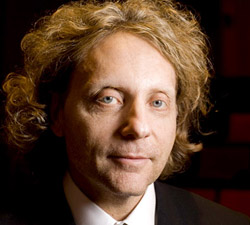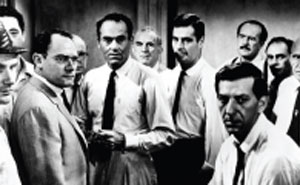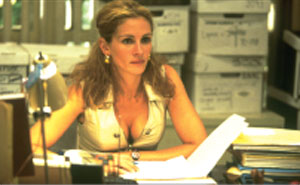Fordham Law's Unique Film Forum Boasts a Cast of Stars--and Faces an Uncertain Future

Thane Rosenbaum, Photo courtesy Fordham University
On a Sunday afternoon in October in New York City, a crowd is filing into the McNally Amphitheatre at Fordham University’s law school. There’s the expected assortment of law students and attorneys in attendance. But the 500 or so people in line also include media executives, retirees, 20-something computer programmers and—most strikingly—three women dressed in Mennonite outfits.
All are there for the same reason: The chance to view Sidney Lumet’s 12 Angry Men, along with an even rarer chance to hear U.S. Supreme Court Associate Justice Sonia Sotomayor talk about the movie, its effect on her decision to become a prosecutor, and the differences between trials in real life and their portrayal on film.
It’s not every day that a law school can lure a Supreme Court justice to watch a movie with a crowd of civilians during a film festival, but then this is no ordinary film festival.
Five years ago, under the direction of then-Fordham dean William Treanor, the school launched the film festival as the centerpiece of its Forum on Law, Culture & Society.
The unique, nearly weeklong event, which is free to the public, screens a variety of legal-themed movies that include a mix of current releases, classics, documentaries and indies—all with the intention of fulfilling the school’s goal of helping to illuminate the legal system to the public “along with all of its triumphs, failures, moral dilemmas and dramatic moments.”
But, for many, the allure is not so much the films themselves but the chance to hear—and discuss— the movies and related topics with noted artists, lawyers, intellectuals and others connected to each film. Over the years, the film festival has drawn such boldfaced names as right-to-die activist Dr. Jack Kevorkian, film director Peter Bogdanovich and First Amendment litigator Martin Garbus—all of whom have sat on stage with film festival director and Fordham law professor Thane Rosenbaum and engaged in freewheeling discussions.
“The key thing, really, is the guests,” Rosenbaum says. “Otherwise we compete with Netflix.”

12 Angry Men was one of the two films featured in this year’s festival.
NO LIMITS
Nothing seems off-limits. Take Sotomayor’s recent appearance. After viewing 12 Angry Men with the crowd—she chose the movie, Rosenbaum says—she and Rosenbaum engaged in a lengthy conversation that ranged from how the movie changed her perspective on juries to her determination to get a manicure at a local nail salon without being accompanied by federal marshals.
If it seems improbable that a law school perhaps better known for producing New York City prosecutors can pull off such a feat, then one need look no further than Rosenbaum for the Herculean effort.
Rosenbaum, a full-time faculty member at Fordham University School of Law and director of the school’s Forum on Law, Culture & Society, is a critically acclaimed novelist and essayist. His work has given him access to a vast network of intellectuals, celebrities and pop culture icons, as well as a Rolodex chock-full of contacts. He doesn’t hesitate to use it to draw marquee speakers to the law school for forum events, because he views it as a worthy cause.
“The forum observes the way culture and society have been influenced by the law,” says Rosenbaum, who conceived the program in 2002. “It’s a great way to address something in the broader culture that law schools never focus on.”
While Fordham calls its Forum on Law, Culture & Society “a public humanities program,” Treanor saw it as a way to leverage Rosenbaum’s network in order to raise the school’s profile within the larger New York metropolitan community—and to showcase Rosenbaum himself.
“The relationship between law and culture is an important issue,” Treanor says. “Because of Thane, we were in a position to become leaders on that.”
“Thane is really an extraordinary talent. He’s a very gifted novelist; he’s a wonderful teacher, a very interesting scholar,” adds Treanor, now dean of Georgetown University Law Center.
Also, says Treanor, the forum is fun. “It’s part of what Thane and I would call the ‘cool stuff initiative.’ It’s really exciting and it really energizes the law school community.”
For his part, Rosenbaum hopes the forum will be at least as entertaining as educational. “We always saw ourselves as competing with the 92nd Street Y and Carnegie Hall,” Rosenbaum says. He adds that he hopes people ask themselves after an event: “Is this a law school or a PBS talk show?”
In addition to the film festival, the forum hosts a series of “conversations” throughout the year where Rosenbaum and high-profile guests that have included novelist E.L. Doctorow, playwright Tony Kushner and actor Alec Baldwin discuss pop culture and the law.

Erin Brockovich was among the films screened in 2009.
AN OFFER YOU CAN’T REFUSE
Those Rosenbaum doesn’t know personally, he reaches out to. “It’s hard to say no to Thane,” Treanor says.
Others who have come to Fordham to speak at the film festival or at the speaker series have included movie director Barry Levinson, lawyer and author Scott Turow, and former New York Govs. Mario Cuomo and Eliot Spitzer.
Much of that track record is due simply to the force of Rosenbaum’s extroverted personality. Worse Than War author Daniel Goldhagen, a guest speaker at this past year’s film festival, recalls how he first met Rosenbaum.
According to Goldhagen, Rosenbaum became a close friend after a chance encounter at a bookstore almost 15 years ago. At the time, Goldhagen’s Hitler’s Willing Executioners had just been released, and Rosenbaum recognized Goldhagen from the publicity surrounding the book. Rosenbaum quickly struck up a conversation with Goldhagen and a friendship ensued.
Rosenbaum used those same networking skills to secure Doctorow and Kushner for the forum’s inaugural event in 2005: a discussion about the espionage case against Julius and Ethel Rosenberg. Both writers had addressed the couple in their works.
As with many of the guests, Rosenbaum knew Doctorow and Kushner personally from other cultural and literary events. That conversation, held at the Time Warner Center a few blocks away from the law school, drew a standing-room-only crowd of a few hundred people—including Sotomayor.
Rosenbaum says one reason he invited the Supreme Court justice to the most recent festival is because he knew she had attended the earlier Fordham Law School event.
A HIGHER CALLING
While convincing a Supreme Court justice to appear at a law school is the kind of thing that impresses attorneys, Rosenbaum appears far more interested in connecting with a mass audience than showing off for his colleagues. In addition to writing novels like The Golems of Gotham and Second Hand Smoke, he authors pieces for outlets like the Wall Street Journal, Los Angeles Times and Huffington Post and has served as literary editor for Tikkun.
After quitting his job as a litigator with Debevoise & Plimpton in 1991, he turned to teaching to anchor him while he pursued a second career as an author. “I wasn’t cut out to be a day-to-day practitioner,” he says. “I felt that there was a side of me that needed to be heard in a different way.”
With shoulder-length light-brown curls, a direct gaze and a dynamic speaking style, Rosenbaum—who bears more than a passing resemblance to a young Gene Wilder—easily holds an audience’s attention.
As a former law review editor and judicial clerk, Rosenbaum had the resumé to land a teaching position. “I didn’t think I was going to go off and write a novel and wait tables.”
He started teaching at Fordham in 1993 as an adjunct before landing a full-time position in 2001. The son of Holocaust survivors, he pitched the school a course about law and the Holocaust. Eventually he added other subjects to his repertoire, including law and literature, for which his syllabus includes works such as Harper Lee’s To Kill a Mockingbird, Charles Dickens’ Bleak House and Sophocles’ Oedipus the King.
His biggest critical success to date probably occurred in 2004, when the publication of The Myth of Moral Justice: Why Our Legal System Fails to Do What’s Right cemented his reputation as an expert on law and culture. The New York Times said Rosenbaum “set the terms of public debate” with the provocative book, which argues that the legal system does not always result in the truth coming out.
As head of the forum, Rosenbaum continues to explore how the law’s depiction in the movies—where everyone is seeking the truth—differs from real life, where cases often settle before litigants can even tell their stories to a judge.
“The movies very much speak to what’s absent in the law,” says Rosenbaum. “They speak to a longing for what courtrooms can be and should be, what lawyers can be.”
“The lawyers of our imagination become these protagonist heroes who are filled with a tremendous sense of responsibility,” he says. “It’s a very romantic idea—the lawyer who’s not just billing time.”
In fact, much of the discussion during the festival centered on the differences between the portrayal of cases in the movies and real-life trials. Sotomayor, for instance, said 12 Angry Men was “far from reality.”
Had actual jurors followed the example of Henry Fonda’s character—who conducted his own investigation by going to the defendant’s neighborhood and purchasing the same supposedly unique switchblade found on the defendant—there would surely have been a mistrial. “Certainly you don’t want them going for a walk late at night and picking up a knife from a pawnshop,” she said.
At the same time, portions resonated with Sotomayor. “I had never thought about juries and their functions until I saw this movie,” she said. One character in particular, an immigrant who worked as a watchmaker, gave a speech about the jury system that made an impression on the future judge. “It sold me that I was on the right path,” said Sotomayor, who served as a prosecutor in her early career.
Actor Jeffrey Tambor, who portrays an unglued criminal defense lawyer in And Justice for All, also appeared at this year’s film festival. During the post-screening discussion he remarked about how he worried during filming that the movie’s portrayal of the justice system was “too much.” So, he said, he went to a real court to watch the proceedings. While there, he happened on a case dealing with the theft of a turtle. The seriousness of the crime depended on the animal’s age—something that the lawyers were attempting to determine in court by counting the number of rings on the turtle’s shell. “I said to myself, ‘We’re going to be fine.’ ”
While figures like Tambor, Turow and other guests appear for free, the forum still shells out money for their travel expenses. Other costs include licensing fees, advertising, website hosting and the like. Initially launched with funds from the law school, Rosenbaum now raises money himself to cover the forum’s expenses, which run to $250,000 a year.
To secure funds, Rosenbaum reaches out to a variety of sponsors—including businesses like Whole Foods, Time Warner and HBO—and, of course, alumni.
Hugo Barreca, a 1997 Fordham Law graduate, was among the inaugural donors to the forum. He says he decided to contribute after another faculty member introduced him to Rosenbaum.
Barreca, who holds an undergraduate degree in comparative literature, says he’s interested in the “influence of narrative on our culture.” As an attorney, Barreca also is interested in exploring how stories about the law affect people’s beliefs about the justice system. “When people come to lawyers, to correct an injustice or to receive some sort of compensation for a wrong that’s been done, each one of those people is coming with an idea of what the law can deliver that has been pre-formed by a lifetime of consumption of media,” he says.
Despite the impressive roster of guests and positive press reaction—the 2010 film festival was written up in the New York Times and Women’s Wear Daily—the forum’s future with Fordham is uncertain because Treanor—its patron and protector—left for Georgetown Law in 2009.
Rosenbaum already is laying the groundwork to take the forum elsewhere, should the program fail to garner the new administration’s support. Rosenbaum says the forum recently became a not-for-profit corporation that can migrate to another school. He’s also in the process of setting up a board of directors.
While Rosenbaum says he finds it hard to believe that a new dean would dismantle the forum, given its success and reputation, he acknowledges concern about the possibility.
“If you’re a dean who thinks the law school is really about scholarship, this could be perceived as too public,” Rosenbaum says. “Too outside the primary mission of the law school. Too glitzy.”
View highlights from the film festival.
Wendy N. Davis is a lawyer & journalist in New York City.



